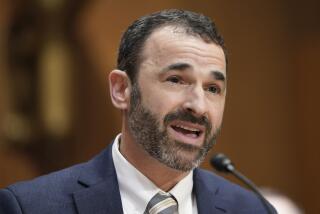ECONOMY : Rich Slip Through Brazil Tax Cracks to Tune of $83 Billion
- Share via
RIO DE JANEIRO — Sometime early next week, 4,000 wealthy Brazilians--including the nation’s 460 richest families--will get the kind of letter that sends chills down the spines of most Americans: The tax man cometh.
He will be seeking a large part of $83 billion in taxes that the government says the rich and other Brazilians evaded last year through outright cheating or by slipping through the gaping loopholes in Brazilian tax laws.
The outstanding debt figure, released early this week, was stunning in itself because it totals:
* Almost as much as the $85.5 billion the government here actually collected in taxes.
* Roughly twice the nation’s federal reserves.
* About twice the amount of money in personal savings accounts.
* More than the combined sales of the top 1,400 Brazilian companies.
* Enough to buy the entire Brazilian auto production for the next four years.
That Brazilians cheat on their taxes was hardly news.
“In Brazil, there is a culture of tax evasion,” said Sen. Ronan Tito, who heads a congressional commission investigating the practice. “It runs from the lawyer to the doctor to the largest magnates of the country. If we locked them all up, the Maracana (a 200,000-seat stadium) couldn’t hold them.”
But what has shaken Brazilians about the recent revelations are the striking examples of alleged tax evasion by the wealthy in this country, which has one of the world’s greatest gaps between rich and poor and where more than 50% of the population subsists on an average of $150 a month.
In 1992, for example, the tax bureau reported that:
* Wiebert Ferreira Tartuce, a congressman and businessman whose $19-million estate includes a 63-room house and 11 cars, claimed an annual income of $30,000. He paid just $2,100 in taxes, less than the amount paid by an engineer at his construction company.
* Camilo Cola, owner of 28 firms, including the nation’s largest interstate bus company, boasted of having an estate worth $154 million. But he declared an annual income of just $84,000, upon which he paid $26,000 in taxes.
* Construction magnate Cecilio do Rego Almeida, with an estate worth $515 million, declared an annual income of $96,000, paying $15,500 in taxes. That same year, he spent roughly $150,000 on his wedding, which included chartering a Boeing 727 airliner to bring guests from another city.
* Sen. Jonice Siqueira Tristao claimed $1.8 million in annual income from a coffee company headquartered in New York, but he paid only $17,300 in Brazilian taxes.
Confronted with cases like these, “People are quite upset,” said congressional aide Joao da Silveira in Brasilia, the capital. “In the past, there was apathy about this kind of thing, but now, everybody is saying, ‘I pay so much, and these people pay so little.’ ”
The wealthy pay relatively little, experts say, because they--or their accountants--know how to exploit the huge loopholes in Brazil’s tax law. Executives and business owners, for example, routinely hide personal expenditures and earnings, claiming they are company expenses. They avoid paying taxes on some income by claiming that it is exempt because it came from exempt gifts and donations.
“I agree that I should pay more, but I can’t do anything with the faulty legislation in relation to large fortunes,” said Olavao Egydio Monteiro de Carvalho, the president of holding and construction companies. He paid $72,500 in taxes on an estate worth $36 million and a declared income of $420,000.
Even when scofflaws are brought to justice, the long, legally required, eight-step procedure to make them pay up can drag on for 12 to 15 years, government officials say.
The whole situation has critics crying out for reform. But getting such measures through the Congress might prove difficult. As federal records show, many lawmakers are themselves some of the worst tax evaders.
Still, Sen. Tito is hopeful. “We have three very good proposals being presented now,” he said. “Maybe one of them will get through.”
More to Read
Sign up for Essential California
The most important California stories and recommendations in your inbox every morning.
You may occasionally receive promotional content from the Los Angeles Times.













